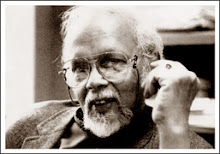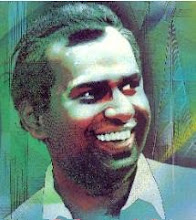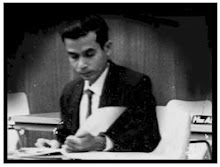Breaking through the fourth wall
|
He looks at the pieces of furniture, ranged against the fourth wall, with an inventive enthusiasm. He is now a soft giant – his theatrical splendour whizzing around the stage, above and beyond. He had the opportunity to dine good and proper with giants on the stage: Ediriweera Sarachchandra, Dayananda Gunawardena, Sugathapala de Silva, Gunasena Galappatti and Henry Jayasena.
Mano, as he is fondly known in the performance scene, entered the theatre at his school Poramadulla Central College, when Sunil Sriyananda chose the lad for his Aspa Gudung. The play was among the shortlisted eight at the annual inter-school drama competition and the performance earned Mano a merit award.
He stepped into the University of Peradeniya and had the blessed company of Professor Ediriweera Sarachchandra, the legend behind Maname and Sinhabahu fame. Those were the days filled with eloquent surprises. The professor was impressed with his voice when he sang Amaradeva’s Vasanthaye Mal. He was offered a major role in Pemato Jayati Soko; he could play diverse roles in Maname and Sinhabahu. They were slowly approaching the 1970s then.
Even with the feet firmly set on other media – the small and the silver screens – Manoratne was covetously in demand throughout the 60s and 70s on the stage. Manoratne is not just a theatre performer, but he is one of the few who have studied theatre and performance – from folk to stylized mode - academically.
And now, he looks back in that fourth wall.
| |
The fourth wall is an imaginary wall at the front of the stage in theatre, with three walls around, through which the audience sees the performance of the play. The stage plays Mano has been producing for quarter of a century now come as ‘the Fourth Wall series’ from September 15 to 19 at the John de Silva Memorial Hall. The series follows a free-of-charge course for theatre fans in the mornings of these days. Fifty candidates will be selected for the course, which will issue a certificate upon the completion. Tickets are available at Rs. 100 to encourage a large audience. The Hall will be decorated with book fairs, street plays, rare photos and scenes from yesteryear’s drama scene.
| |
| The Manoratne |
| An incomplete glance |
| Theatre |
| Sunil Sriyananda’s Asva Gudung |
| FILM |
| Tilaka saha Tilaka |
| TELEDRAMA |
| Doo Daruwo |
| LITERATURE |
| Dolos Mahe Pahana |
| RADIO |
| Sandella |
“I should be thankful to the Cultural Department to have given the John de Silva Memorial Hall free of charge. That’s why we could reduce the ticket prices too.”
Of all the plays in the festival, Talamala Pipila is the oldest, which was first produced in 1988. Its script has now been prescribed for O/Ls. His books Andarela and Guru Tharuwa have won the State Literary Awards.
All these plays, Mano muses, have one theme: love the mankind without difference.
| Your September |
| 15 Tala Mala Pipila " 16 Guru Tharuwa 17 Sudu Redi Horu 18 Lokaya Tani Yayak 19 Andarela At John de Silva Memorial Tickets are available only |
Tala Mala Pipila brings out the generation gap. The traditional musician’s son gets caught in the waves of modern trend, and becomes a victim. Guru Tharuwa is about our fate when literature is wiped out of the schools. Sudu Redi Horu is an attempt to introduce the age old Sandesha poetry mode into the stage play. Lokaya Tani Yayak introduces Mahagamasekara and his poetry into the stage. Andarela is set on the 19th Century Sri Lanka.
The cast of about 80 performers has Suminda Sirisena, Ratna Lalani Jayakody, Sarath Chandrasiri, Rodney Warnakula, Ajith Lokuge, Sampath Tennakoon, Chandrasoma Binduhewa and Madani Malwatta. Manoratna is now seen on teledrama more than the stage.
“We had a goodwill attitude when we started off the teledrama industry. But now it has become a vanishing trail. All teledrama directors have to oblige with the sponsor-decided budgets and the time-span.” Always going through the script before anything else, Manoratne does not hesitate to turn down the drama if it is not up to his satisfaction.
The stage response keeps on fluctuating from time to time. For the past two years, however, the stage enjoyed a good audience. “They are now hassle-free. They are not scared to step out of the threshold. More audience for the stage means the bankruptcy of the tele industry. The people are disappointed at teledramas. That’s why they flock together with the stage.”
Bringing out a stage production – though people are ready to be in the audience halls – is nevertheless a tough job. Manoratne lays down the difficulties one by one.
Finding a good script is so much harder than gathering a good cast. He doesn’t see anything bad in translated scripts – for it brings us to the world-renowned works - but, says he, we should have our identity too, at the same time.
“If you go to France, you can see they have their own theatre. If you go to Germany, you can see their own theatre. All these countries are relatively younger than ours. We have our own traditions. Sarachchandra and others had been attempting to rediscover it.” Compared with the tele industry, the stage has a zero percent assistance of a producer. It is the next hurdle. Then comes the difficulty of getting a well-practised senior cast.
“We keep on practising for two or three months without any financial gains. Most of the seniors have sacrificed their time for the sake of the stage play.”
Mano has been travelling throughout the country, since ours is a mobile stage culture. The theatre fan in Thambuttegama obviously cannot make a journey whole way to Colombo merely to see a stage play. The Sinhala stage has a good audience even in rural areas. Many artistes think their job is done, once a work of art is completed. It is not so for the stage artiste in the calibre of Manoratne. He keeps on improving their theatre work.
Manoratne has clinched many awards ranging from OCIC, Presidential, Sarasavi and the State Literary and Drama awards. He was the best actor back to back in 1991 and 1992 for his performance in Socrates and Dvitva.








































No comments:
Post a Comment